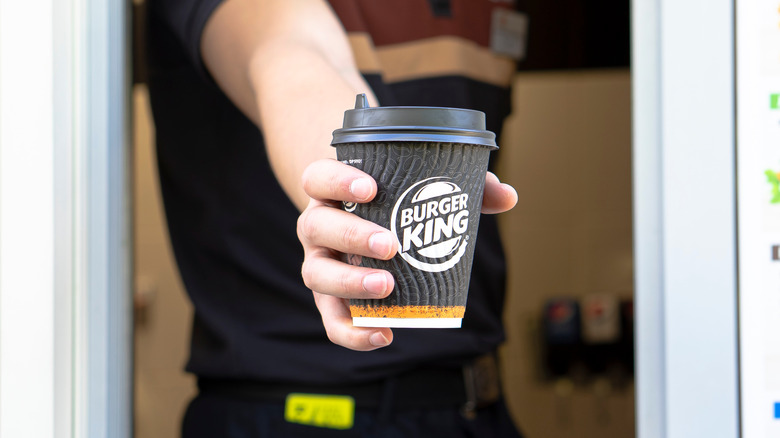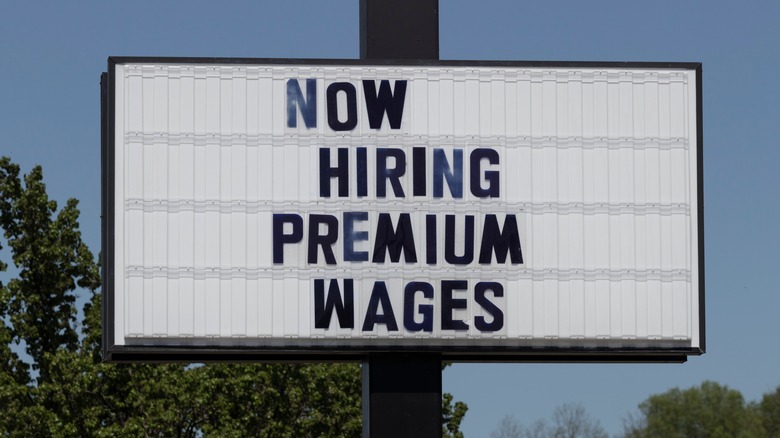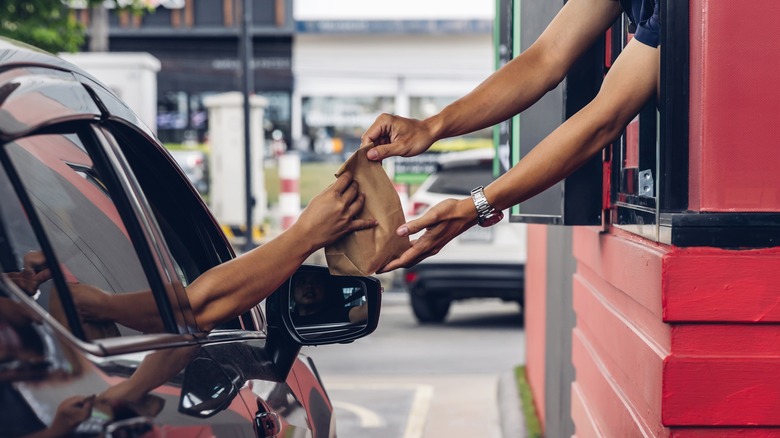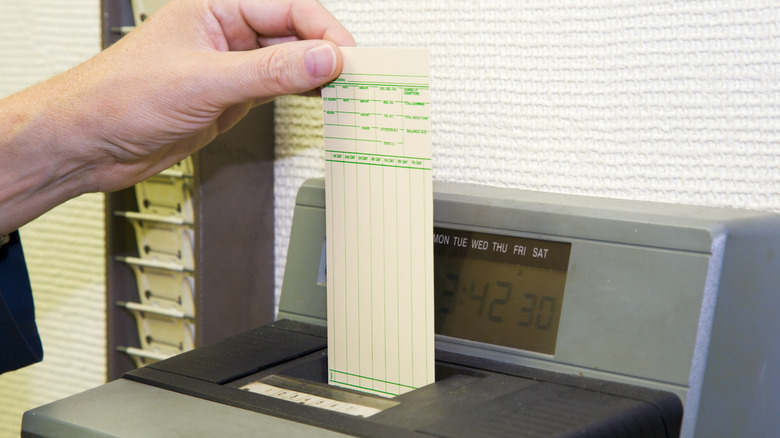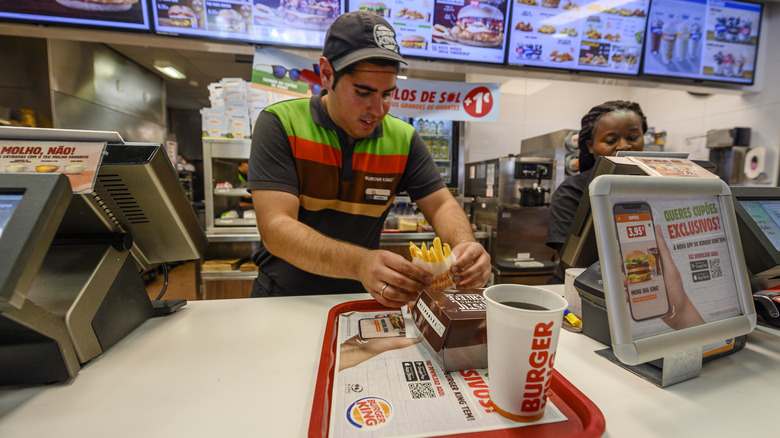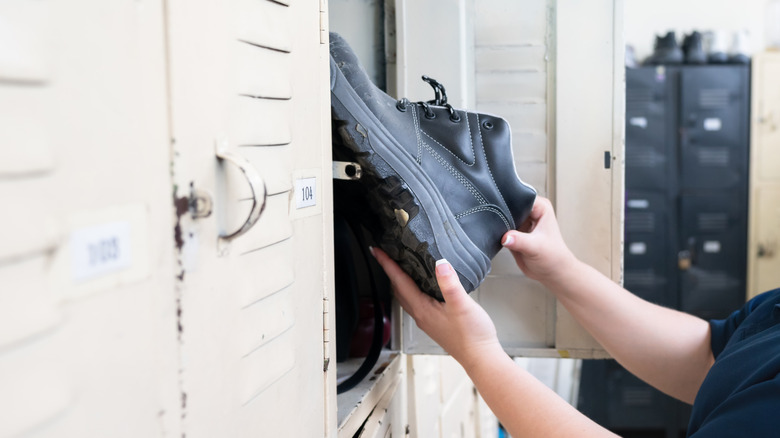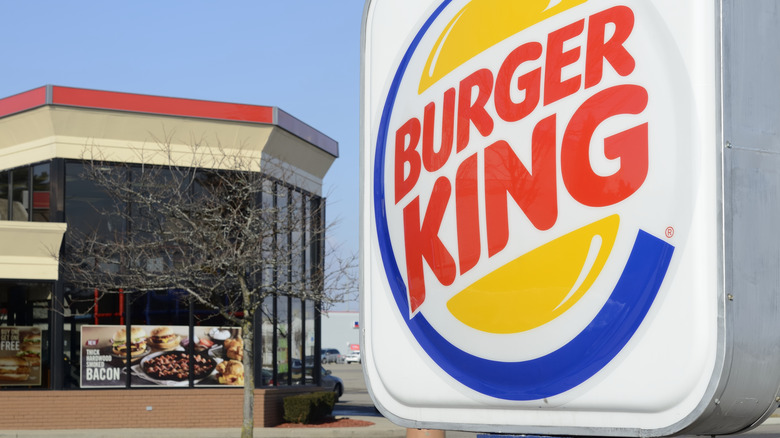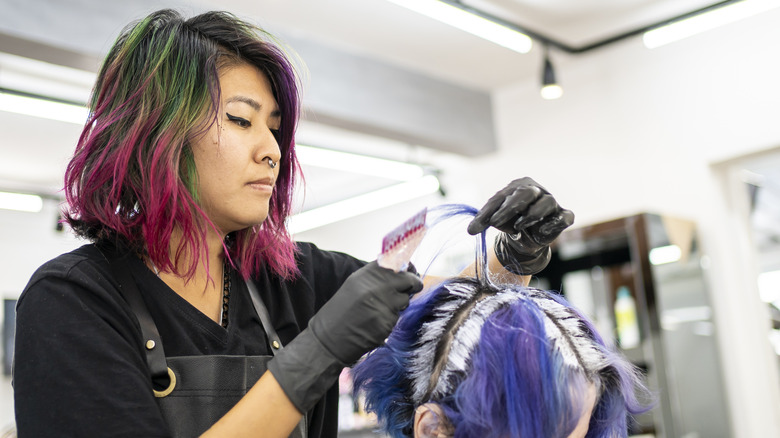Weird Rules Burger King Employees Have To Follow
A Burger King in Lincoln, Nebraska went viral in 2021 when its outdoor sign read, "We all quit. Sorry for the inconvenience." Nine employees had quit the location, citing poor working conditions. The former store manager told Today, "We had just got really tired of upper management and them not coming to help and not caring about the employees." The staff's complaints included short staffing, long hours, and a kitchen A.C. unit that was broken during the summer.
While this location may not represent all Burger King restaurants, it's no secret that working in the fast food industry can be stressful. The pace is fast, and customers are often demanding. A 2023 report from Restaurant Dive revealed that only 54% of fast food employees in 2022 exceeded 90 days on the job before quitting. According to the outlet, these workers' top concerns were "wages, management, and scheduling." Beyond these factors, some companies enforce policies that may have been made with good intentions but don't always make sense. For example, Chick-fil-A employees aren't allowed to say, "You're welcome" (the company prefers "My pleasure"), and Starbucks employees must stand in designated places called "planted positions."
Burger King has its own set of odd employee rules, some of which don't seem to offer much in terms of productivity or company morale. Breaking these rules can mean disciplinary action or even termination. Here are 12 strange rules Burger King employees have to follow to keep their jobs.
Employees are required to tell each customer, You rule.
A 2022 Burger King rebrand forces employees to tell every customer, "You rule," and offer them a paper crown. The idea behind the campaign is "to relentlessly pursue a better experience for our Guest," as Tom Curtis, president of Burger King North America, explained in a press release. Tom O'Keefe, OKRP CEO, further explained the impact on customers, saying, "We're giving them permission to feel like winners, with Burger King as a small reward that makes their day a bit better."
In 2024, Bloomberg published research indicating that Burger King customers perceived friendly interactions to be shorter, thus boosting customer satisfaction. This policy may have the intended effect of cheering customers up, but not for the reason Burger King hoped. One customer claimed in a 2024 Reddit thread, "I went to BK for the first time since I was a kid yesterday and when the cashier told me 'you rule' with the flattest expression ever it startled me so much I almost burst out laughing."
Burger King appears to be strictly enforcing this policy, with Bloomberg reporting that the company conducts regular store visits. In a separate Reddit thread from 2023, a self-proclaimed Burger King general manager confirmed this, saying, "As the GM, I am required to have employees say 'YOU RULE' over the headset. I could get in massive trouble if I'm not requiring people to say that."
Employees who quit Burger King aren't allowed to work at another Burger King for six months
If you work for one Burger King store but a different location offers you better pay, you have to wait six months before you can take the new job. Nearly all Burger King stores are franchised by independent owners. This means separate Burger King locations that are physically close to one another are likely owned and operated by different management. For many years, Burger King employees who wanted to leave their store for better pay, a more convenient location, or to work under different managers were not allowed to do so. This is called a "no-poach, no-hire" policy, and it was included in Burger King franchise agreements from at least 2010 to 2018.
In 2018, Burger King faced tremendous pressure from the Department of Justice to do away with the no-poach policy in its franchise agreements, and indeed, new franchisees no longer had to sign the no-poach clause. Even so, existing franchises continued to operate under the rule. According to a 2022 report from HR Dive, litigation concerning this "no-poach" clause was part of a potential lawsuit against Burger King. The workers claim that "the company's agreements prevented them from obtaining employment at other franchise restaurants, allegedly resulting in artificially depressed wages, decreased benefits and reduced job mobility."
Employees must have written permission to get a second job at another fast food joint
According to data collected by Zippia, fast food workers across the U.S. make an average of $11.95 per hour. At full-time hours, this is a little under $25,000 per year, which falls below the government's poverty level for a family of four. (This also assumes that the job offers 40 hours of work per week.) If teenagers still living with their parents were the only people working these jobs, this may not be as much of a problem; however, this is a common misconception, as the average fast food worker in the U.S. is 23.
It's unsurprising, then, that over half of fast food workers have second jobs. If a Burger King employee wants to get a second job at another fast food restaurant, however, they need to get permission in writing from their store manager. If permission is denied, they won't be allowed to get a second job without fear of discipline or termination. According to Burger King's employee handbook, "If your second job creates a potential conflict of interest (i.e., working for a competitor) you are required to obtain written approval, in advance, from your store supervisor, Field Leadership, or Human Resources."
Overtime shifts are mandatory
While some employees might jump at the chance to make extra money by working overtime, not everyone is available to work extra hours. Burger King employees, however, must be willing to accept overtime shifts whenever they're scheduled. According to the restaurant's employee handbook, "The Company may periodically schedule overtime in order to meet business needs. We will attempt to give as much advance notice as possible, and we expect that all employees who are scheduled to work overtime will be at work."
Working mandatory overtime is legal in the U.S., and employees can't refuse it without risking disciplinary action; however, forced overtime can lead to stress and low morale in the workplace. A former Burger King employee commented on Indeed that the most stressful part of their job was "the manager making you work overtime [because] they won't hire more people." Another former employee wrote on Indeed, "Management will overwork you and try to have you stay overtime and schedule you late at night even if you have school."
Employees are discouraged from trading shifts
It's reasonable that a manager would want to know ahead of time that an employee wants to exchange shifts with another worker. For one thing, employees have different experience levels, and managers need to ensure someone with sufficient experience is on duty. That said, if everyone working has the same level of experience and the employee requesting the swap is still working their scheduled number of hours, should management care if employees want to exchange shifts?
Burger King's rules go beyond standard management oversight. For workers at the fast food chain, shift changes are discouraged altogether. The employee manual states that "work schedule exchanges will not be approved for the mere convenience of an employee." While these swaps may be approved in certain instances, approval is unlikely to be based solely on an employee's preferences. Worth noting is that these changes are at the management's discretion, and many employees on Indeed report that they are allowed to trade shifts. The restaurant's official policy does discourage shift-swapping, though this likely differs from store to store.
'Have It Your Way' means employees must be ready to customize every menu item
Burger King prides itself on its customers' ability to customize the menu. In 1974, the restaurant launched its "Have It Your Way" slogan to compete with McDonald's since, while you could make custom orders at the Golden Arches, this often stalled the line and required a lengthy wait. Although the "Have It Your Way" slogan has come and gone over the years, Burger King has always focused on letting customers personalize their burgers. This customization extends to other menu items as well, and today's employees find themselves customizing everything from burgers to breakfast sandwiches to ice cream.
Want a burger with four patties? No problem. How about 10? Yes, Burger King will do that, too. You can order plenty of Burger King menu hacks that the chain doesn't officially offer, such as ICEE floats, sundaes with bacon, burgers with french fries inside, customized milkshakes, and practically anything else you can imagine.
While this freedom to order your meal however you want is great for customers, it can get stressful for busy employees who have to create elaborate menu swaps. Customizing burgers won't always add extra work, though, as one Burger King employee explained on Reddit: "Been working for The King for many years and most orders I appreciate [it] because 80% of the time it was to remove vegetables or having no mayo. Ergo [fewer] steps and faster orders if our team had a good day."
Management may search an employee's personal belongings
Some Burger King stores offer personal lockers to employees; these workers may bring their own locks and secure their wallets, purses, and other valuables inside. This seems like a nice perk and a convenient way for workers to keep their personal belongings safe and away from public spaces; however, if an employee uses a Burger King locker, their belongings may be inspected at any time and without their knowledge. According to the employee handbook, "the Company reserves the right to inspect the lockers and their contents at any time with or without advanced notice or approval."
Employees' lockers aren't the only areas subject to search, either. As the handbook notes, if a store manager has any reason to suspect that an employee has violated Burger King's substance abuse policy, they have the right to search not only the contents of the employee's locker but also their "vehicles, lockers, work areas, desks, purses, briefcases, backpacks, and other locations or articles without prior notice." The manager need only have "reasonable suspicion" to search employee belongings. Of course, what counts as reasonable suspicion is subjective and could differ between supervisors. Refusing to cooperate with a search can result in disciplinary action for or termination of the employee.
Employees may be required to work at a different location than the one that hired them
When a fast food restaurant hires an employee, standard procedure dictates that the location where they were hired is the location where they'll work. Other businesses may move workers around, but the fast food industry isn't particularly known for this; however, even though a Burger King employee may be hired at one location, the chain has the right to reassign them to a different location, either permanently or temporarily. As Burger King's handbook states, "The company may ask you to work at another location within the company at any time, either temporarily, or permanently as the needs of the business require. The location [will be] within less than a 30-mile radius of the employee's current work location."
A 30-mile radius can equate to a long car drive, and the employee handbook doesn't mention any compensation for commute expenses. Some employees may also rely on public transit to get to work, while others may either walk or bike, all of which make a 30-mile commute either difficult or impossible. Refusing to comply with a manager's requests may result in disciplinary action or termination.
Burger King carefully monitors company emails
Company email and instant messaging accounts are never going to be private. Employees of any company should be aware that employers can legally monitor their work accounts at all times, so it's best to keep company emails on the professional side; however, Burger King takes this policy to the extreme. To start, the fast food chain expects employees to provide their passwords — even for personal computers used for company business — to its I.T. department. Changing your password without alerting I.T. beforehand can result in disciplinary action.
According to the employee handbook, Burger King will monitor all information "transmitted, downloaded, received, reviewed, viewed, typed, forwarded, or stored in Company IT." Furthermore, if an employee sends or receives a message that management determines is "inappropriate," the employee can be disciplined. As for what, exactly, is considered inappropriate, Burger King notes in the handbook, "it is not possible to identify every type of inappropriate or impermissible use of the Company's IT."
Beards are not allowed, but mustaches are
The law requires that food industry workers either be clean-shaven or wear a beard net when handling food. Hair nets — and, by extension, beard nets — help keep food clean and sanitized. Fast food employees who are only serving beverages and wrapped food are not bound by this requirement, but even so, Burger King has a standard policy prohibiting employees from having beards, whether they work at the counter or in the kitchen. Oddly enough, this doesn't apply to all facial hair, as mustaches and sideburns are allowed as long as they aren't "excessive" and are "neatly trimmed," per the employee handbook. Beards, on the other hand, "are not allowed."
Although not every Burger King location seems to be enforcing this facial hair policy, one employee wrote on Indeed, "Beard nets are mandatory if a beard is present, although oftentimes, managers won't allow beard nets in the store at all and would rather send an employee home with a write-up." If mustaches and sideburns are permissible and bearded employees aren't always allowed to wear a beard net, then this rule seems to be more about appearances than food safety.
Only store managers get bereavement leave
Store managers and higher-ups at Burger King are entitled to three days of paid bereavement leave; however, employees below the store manager level are not. Depending on what state they live in, employees may be eligible for unpaid time off following the death of a direct family member, but no federal policies require a company to give employees time off — either paid or unpaid — to attend a funeral, make arrangements, or grieve their loved one. This leaves the issue up to a company's discretion.
According to Burger King's employee handbook, unless you're a store manager or above, you may be able to ask your supervisor for time off to grieve a loved one, but it will be unpaid, even if you work full-time. Taking unpaid time off for funerals and other arrangements would likely only be an added hardship for many fast food workers making minimum wage. This rule is common at many similar establishments — even full-time employees are not always offered paid time off for bereavement or to attend a funeral.
Employees can't dye their hair unnatural colors
Food establishments often enforce dress codes to ensure that employees can avoid health code violations. For example, nail polish isn't allowed when preparing food unless the employee is wearing gloves. Other employee dress codes at restaurants appear to be less focused on hygiene than they are on appearance. As just one example, many Burger King locations don't allow employees to dye their hair unnatural colors.
While this isn't an official policy in the employee handbook, many Burger King employees have explained on Indeed that they're prohibited from having colored hair at work. One employee wrote on Indeed, "You are not allowed to have any wild colored hair, if it is [an] unnatural color it has to be dark and wear your hat at ALL times, if it's not dark they will not let you work." Another employee claimed that a manager wrote them up for having colored hair. This policy does seem to vary by location, as some Indeed respondents claimed that they could have dyed hair as long as they kept it pulled back in a ponytail or bun. Worth noting is that Burger King isn't the only fast food restaurant to prohibit brightly colored hair. For example, employees at Chick-fil-A are also required to keep their hair a natural color.
